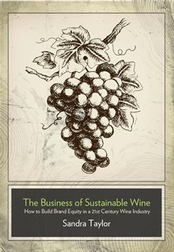Please be sure to take a few minutes to read the column we’re featuring this week by Sandra Taylor, who is among the most accomplished and interesting people I know in the entire world of wine.
By way of background, let me note that those of us who love wine–which presumably includes everyone who visits Wine Review Online–love it for many reasons, ranging from its fascinating variety to its sheer deliciousness.
Speaking for myself, one of the aspects of wine that first entranced me was its essential natural-ness. Wine can actually occur spontaneously in nature, which indeed it does whenever the wild yeast on the outside of a grape comes into contact with the ripe juice on the inside. Stated more simply, when I had my wine “epiphany” many years ago when first tasting Krug’s “Grand Cuvée” Champagne, one of my first reactions was, “How is it possible to make something so intricate and mesmerizing from grapes?”
Of course, wine is not simply a natural product, but also a “cultured” one (hence the term, viticulture), and when made in very large volumes, even an “industrial” one. This last characterization isn’t terribly romantic, but it is foolish to decry wine made on an industrial scale, as such wines can be excellent in quality–and affordable enough to provide a point of access for many people who would not otherwise try wine in the first place. Similarly, there’s nothing inherently wrong with industry per se, which can be either a boon or a bane to human life, depending on whether it is conducted conscientiously or not.
Even if you agree with these points, you might still join me in wondering, “What does it mean to say that a wine is produced conscientiously…or  sustainably?” To get a sense of how to think about that question, I’ll turn you over to Sandra Taylor.
sustainably?” To get a sense of how to think about that question, I’ll turn you over to Sandra Taylor.
Sandra is recognized worldwide as an expert on sustainability in the food and beverage business. Formerly senior vice president of corporate responsibility at Starbucks Coffee Company, she has also held senior leadership positions in public affairs, international trade policy and corporate citizenship. These included stints as a U.S. Foreign Service Officer and legislative council for international trade policy in the U.S. Senate. If those engagements seem rather removed from wine, you should know that she holds a Wine MBA from the Ecole de Management de Bordeaux–Kedge Business School, along with a B.A. in French and a J.D. from Boston University School of Law.
Now you know what I had in mind when referring to Sandra as “accomplished.” Among her most recent accomplishments is publication in 2017 of, The Business of Sustainable Wine: How to Build Brand Equity in a 21st Century Wine Industry. Our WRO columnist Marguerite Thomas reviewed the book in a column we published on October 10 of last year, which was within a week of when I first met her, when the two of us spoke at a seminar at the Embassy of New Zealand in Washington, D.C., where Sandra resides.
When it comes to wine, Sandra is not “all business,” as you’ll see in future columns. She’s also a wine educator, collector and … like the rest of us … a lover and a tireless student. However, in light of her deep knowledge about sustainability issues, that’s where I asked her to begin in her first column, which I recommend to you with the strongest possible enthusiasm.
~MF
1
